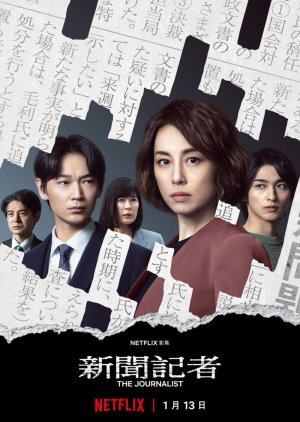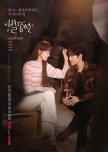Anna Matsuda va traquer inlassablement la vérité sur un important scandale de corruption
Ce drama est réconfortant en ceci qu’il nous montre que, parmi une presse « aux ordres » et ne s’intéressant qu’aux scandales de la jet-set il peut y avoir des journalistes qui ne veulent que faire connaître la vérité et dévoiler les magouilles politico-judiciaires malheureusement trop courantes, au Japon et ailleurs !Je craignais quelque chose de trop gentil, justement un tableau idéalisé de la Chevalière Blanche », avec un triomphe final hollywoodien !
En fait pas du tout !
D’abord, si on abandonne le neutre anglais le titre est « La journaliste », l’héroïne est une femme, et ce n’est pas gratuit ! Elle sera le pivot de toute l’histoire.
L’enquête est sérieuse, les obstacles vraiment difficiles à franchir, la pression politique énorme… Mais l’honnêteté d’un employé qui préfère la mort au déshonneur (on est au Japon ! ) va empêcher de tout mettre sous le tapis. On voit le vrai combat intérieur que certains doivent livrer : risquer le confort de leur famille pour soutenir la vérité, affronter l’ostracisme des adorateurs de l’obéissance absolue déguisée en fidélité. Le vrai courage que cela demande est parfaitement mis en évidence.
Les acteurs sont très bons, très justes, le « méchant » suffisamment antipathique sans tomber dans la caricature. Ryoko YONEKURA est excellente, forte, sensible, tenace… Hidetaka YOSHIOKA donne l’émotion, la sincérité et l’angoisse nécessaires à la crédibilité du personnage.
J’ai donc beaucoup aimé tout le drama pour son intensité bien dosée et surtout pour l’intelligence de la fin, parfaitement écrite avec réalisme et justesse, laissant entendre qu’une victoire ne sera pas la fin de ce genre de guerre !
Cet avis était-il utile?

Ceci est une fiction, toute ressemblance...
Le monde de la politique est impitoyable, quel que soit le pays. On dit souvent que la démocratie est un système imparfait, mais qu'il 'est le moins mauvais. On a pourtant du mal à le croire, quand on se réfère aux événements récents qui entachent les politiciens japonais et qui rentrent étrangement en résonance avec le synopsis de Shinbun Kisha. Le titre ou un survol rapide peuvent faire penser à une longue séance d'autosatisfaction de la part des médias, toujours prêts à défendre la démocratie. Mais c'est bien le monde politique qui est le sujet principal et la cible de ce brûlot qui devrait inspirer plus d'un citoyen endormi par des décennies de corruption et de culture du "moins tu fais de vagues, mieux c'est".Alors que l'assassina d'un ancien premier ministre remet sur le devant de la scène les connivences sectaires des dirigeants, quelques mois avant, comme un avertissement au peuple japonais, sortait Shinbun Kisha, la série. Brulot extrêmement bien produit pour la plateforme Netflix, prenant en toile de fond une affaire d'État, certes trop banale, mais symptomatique du cancer démocratique. Remake , par le réalisateur Fujii Michihigo, de son propre film, sortie en 2019 et que je n'ai pas encore vu, Shinbun Kisha ne se concentre pas forcément sur les journalistes. Alors que la femme du 1er ministre, que l'on ne verra d'ailleurs jamais, est empêtrée dans un scandale de corruption, les protagonistes de ce court drama de 6 épisodes sont les petites mains du pouvoir, ceux qui travaillent dans l'ombre. Bureaucrates, secrétaires de cabinet, etc. à commencer par le secrétaire personnel de Madame, interprété par Ayano Go, tout juste sortie d'Avalanche, où il avait poussé la cool attitude à son max et dont le sujet était déjà la corruption des politiques. Il joue ici un bureaucrate coincé, rongé par les remords qui montre une tout autre facette de son jeu d'acteur.
La plupart des acteurs ont été poussés, d'ailleurs, ici, à surjouer leur côté pathos et larmoyants. Pas un n'a pu éviter de subir les gouttes dans les yeux pour faire déverser des torrents de larmes. Si elles sont évidement justifiées et donnent vraiment ce côté humain à tous ses acteurs qui font partie de la master classe japonaise, cela peut donner parfois le sentiment d'en faire trop. Malgré évidement le tragique de certaines situations, mais qui perdent en intensité du fait qu'un personnage rongé par les remords était déjà trempé de larme en se remémorant ses actes de falsification.
Car c'est la fabrication de faux documents est au cœur de l'intrigue. Il est demandé assez rapidement à des bureaucrates de falsifier des notes pour masquer la corruption d'état. L'intérêt de ce drama, par rapport aux histoires similaires, c'est le souci de réalisme. Pas de manichéisme ici. Personne n'est tout blanc, ni tout noir, et même cet esprit de garder les institutions intactes peuvent trouver une justification. Dommage que la mise en scène force sur le caractère sombre et froid des bureaux de renseignement, des secrétaires d'État ou des antennes régionales. Musique magistrale ou minimaliste, cadrage plongeant, on insiste un peu trop sur le fait que les institutions broient l'individu, même si c'est le cas ici. La mise en scène est de toute façon au moins pour les 2 premiers épisodes assez maladroite. On retrouve les travers des productions Netflix. Tapageuses, séquençage trop haché, avec enchainement de gros plan, de plan plongeant (merci les drones), de caméra qui tourne dans tous les sens et beaucoup trop rapidement. Sans parler de la musique omniprésente, pour pas dire envahissante, et cette profusion de personnages très peu explicite dans les premières minutes, mais qui montre à quel point Netflix a déversé du pognon, au vu des grands acteurs ici présents.
Ce ne sera donc pas pour le scénario trop classique de journaliste en quête de vérité, ni pour la mise en scène trop tape à l'œil que l'on accrochera les premières minutes, mais bien pour tous ces acteurs. Ayano Go bien sûr, Yokohama Ryusei, qui ne met pas pour une fois en avant sa bogossitude et ça fait du bien. Et des noms qui ne parleront peut-être qu'à des gents de ma génération, comme Yoshioka Hidetaka, l'inoubliable docteur Koto, Terajima Shinobu, Sano Shiro, la pourriture parfaite, ou bien même une apparition de Tsuchimura Kaho. La liste est hyper longue, j'ai sûrement homi des acteurs encore plus talentueux. C'en est presque indécent et surtout on n'est pas en face d'un Asadorama de 150 épisodes. La sous exploitation de tous ses talents me rend presque malade.
Mais même Yonekura Ryoko qui joue avec brio l'excentrique Daimon Michiko dans Doctor X depuis des années, manque de scènes dans la série. Tous ces changements frénétiques de lieux, de personnages, toutes les deux secondes des deux premiers épisodes, qui heureusement disparaissent pour faire interagir enfin la plupart des personnages suite à un événement qui calme enfin la frénésie du montage. La série prend vraiment de l'intérêt à ce moment alors qu'il ne reste plus que 4 épisodes. Elle donne à réfléchir non pas que sur le sens de la justice et la stabilité des institutions, mais également sur des choix pour la suite de sa vie, à des tournants de celle-ci. Et pour tous les personnages, finalement. Le côté sensationnel du journalisme n'est pas si mis en avant. Pas de recherche de scoop, mais un rappel salvateur du rôle de l'information dans la société. Si le côté trop cool d'une rédaction est parfois forcé, par rapport aux bureaux austère, le réalisme revient frappé à notre porte avec un ancrage dans notre quotidien. Les événements se passant sur le long terme de 2019 à 2020. Terme nécessaire pour mener une enquête d'investigation. La préparation des JO, puis l'ombre du Covid planant sur le quotidien de nos protagonistes.
En résumé, pour les acteurs, on est fortement attiré, ensuite pour le tableau dépeint du monde du journalisme, même s'il est effleuré, ainsi que pour la perversion du système politique, on restera donc devant l'écran. Et cela malgré toutes les tentatives de Netflix de nous faire fuir par cette production bling bling ou trop larmoyante. À moins que je voulais écrire le contraire. Il est tellement facile de falsifier des documents. Le réalisateur la bien fait, lui.
Cet avis était-il utile?

A voice for the voiceless
An engrossing political thriller that manages a fine balance between human drama and suspense. Reflecting our world where it often seems as though corruption and misinformation are the order of the day, Shinbun Kisha lays out a David and Goliath tale of ordinary citizens standing against government corruption. While the inciting incident might seem small, that’s exactly what the drama tries to highlight; if society remains apathetic to the “small” corruptions, what will the powers that be try to get away with next? It also hits back against the pervasive thought that one person couldn’t possibly make a difference when it comes to political change. After all, we never know what our actions might inspire in others.Some may find early episodes slow, although I felt they did a good job establishing the broad strokes of the story and characters. In later episodes, however, there were some places where the story struggled to keep pace or stumbled over minutiae; the overall quality of the episodes was undiminished, but I sometimes wondered if a scene wouldn’t have been better placed elsewhere or even cut entirely. This was often the case with scenes that included Mayu, who could feel superfluous despite her early involvement in the development of another character.
That said, I found it difficult not to binge Shinbun Kisha. Since it often seems to mirror real life, the plot somehow appeals to the audience’s sense of justice. The characters are relatable for the same reason and win sympathy easily. Like any good story, Shinbun Kisha made me want to know more—but even beyond that, I needed to know if justice would actually be served. It was difficult not to get invested.
The camera is unobtrusive, yet still impactful. For example, during the press conferences where Yonekura Ryoko’s Matsuda is the only one brave enough to drill the administration for answers, she’s literally seated alone with a block of empty chairs surrounding her. Sickly greens and yellows are employed in sequences when corrupt dealings are underway, and chilly blues overlay rooms in which a character has been driven into a corner or frozen out.
Yonekura Ryoko and Go Ayano, perhaps unsurprisingly, are clear standouts in terms of performance. However, Yokohama Ryusei turns in a solid performance as an indifferent youth who slowly begins to understand the power that young people have in shaping the future of a country.
Recommended overall, especially if you like this genre. I'd love to see more like this from Netflix.
Cet avis était-il utile?

Marshmallow-Chocoholic
20 personnes ont trouvé cette critique utile
Is This A Drama Series Worth Investigating?
Loosely based upon the real-life exploits of Tokyo Shimbun reporter Isoko Mochizuki, director Fujii Michihito’s drama ‘ The Journalist’, is adapted in-turn from his 2019 shared-titled feature-film. The Netflix six-part drama offered a golden-opportunity to the director in order to “flesh-out” weaker moments from his original work by offering viewers a vivid vignette of the world of corruption and journalism. Yet despite a brilliant performance by actress Ryoko Yonekura , Yamada Yoshitatsu and Kodera Kazuhisa’s sultry and harrowing storytelling could feel somewhat niche by the second-half.
The storyline focused upon highly-revered and inquisitive journalist Anna Matsuda ( Ryoko Yonekura). When confronted with the shady dealings of a political crime at the heart of Japanese society, Matsuda alongside cynical government official Shinichi Murakami (Go Ayano), guilt-stricken bureaucrat Suzuki Kazuya (Hidetaka Yoshioka),Kazuya’s wife , Mayumi (Shinobu Terajima), and university student Ryo (Ryusei Yokohama), find themselves fighting against a common enemy through Shinjiro Toyoda (Yusuke Santamaria); a PR specialist and official adviser to the prime minister.
Perhaps one of the greatest takeaways from ‘ The Journalist’ came through raising ethical and moral questions towards the universal problem of corruption; especially at the top of worldwide governments. However whilst the series did allow food for thought for its audience, it is noteworthy to point out that no trope or cliche is left upturned in Yamada Yoshitatsu and Kodera Kazuhisa’s screenplay for the reboot. Whilst an artistic licence does allow influences from similar storylines and productions to worm into the series in parts, ‘ The Journalist’ ‘s regimented paper trail to corruption led to some tedious and over-stretched moments throughout. Dialogue , interactions and Matsuda scrolling over documents for a torturously long period onscreen against suddenly falling asleep on her desk and then repeat, could often feel as though the series was trying to heavily pound the insertion of “the devil being in the details” rather than expediting certain events of the storyline.
‘ The Journalist’ is admittedly self-conscious from the outset. Rather than allowing the series to spiral into an over-the-top parody of conspiracy theories and rushed plot, the miniseries allowed itself to be compacted into six episodes. Yet whilst elements of the series’ appeal with Yonekura and Terajima taking frontal stage did begin to make the series feel as though it was a reconstructed reenactment , the actual focal point of the series, the corruption, was rarely covered. Instead, whilst the series did offer opportunities to present the climatic buildup of events and revelations, the brushed over and lingering presence of the main plot drive created an addictive yet slightly farcical edge during later scenes also.
Nevertheless,Fujii Michihito’s return to the director’s chair did certainly present its perks also. Respectfully choosing TV veteran Ryoko Yonekura instead of her movie counterpart South Korean actress Shim Eun-kyung, allowed golden-opportunities to explore the emotional, sentient and conventional range of the main female lead. ( Even if hard-nosed Anna can coincide her psychic ability to arrive at people’s doorsteps just at the right moment.) In addition to this Fuji combined a heavily aesthetic approach to the series- artistic cuts and editing combined with a nail-biting score did deliver a tense atmosphere for viewers. However, the second-half delivered a somewhat languid finale for the series with slower pacing attempting to slow down and make viewers take-in the storyline, but slowly becoming somewhat tiresome and repetitive.
Fujii Michihito’s ‘ The Journalist’ did present a necessary revamp in parts in comparison to its movie counterpart . The six-part series delved into relatable and harrowing issues striking a chord for viewers worldwide . Yet whilst Fujii Michihito’s moody cinematography and in particular Ryoko Yonekura’s brilliant acting did keep viewers intrigued and enticed, niche storytelling and archetypes could make ‘ The Journalist’ feel slightly cyclical and dragged out in parts also.
Cet avis était-il utile?
Journalism is seriously a very tiring job but it could also be inspirational
I am glad Netflix recommended this J drama to me. The amount of J dramas which have great production value are less in numbers but thanks to Netflix there is an increase in them. Being a Journalism student I found this series really inspirational. The story is really simple but the way it is executed is great. I do have to say that they didn't need to mention the Coronavirus. I would highly recommend this show to anyone who wants to see a political thriller. Keep investing more in J dramas Netflix. Their is an untapped potential here.Cet avis était-il utile?

Never Again
"You wanted to be a bureaucrat because you want to serve the people and be of help to the helpless."The Journalist is a story of brave and conscientious newspaper reporter and a few people whose moral conviction was strengthened by the hardships they had undergone. Seemingly powerless, they work together to expose the truth behind the shameless corruption and abuse of those in power.
This is my second J-drama after Miss Sherlock and I must say that the Japanese delivery awesome cinematography and their shots are as neat and organized as they are known to be as a people.
I decided to watch this drama after being frustrated by the results of the national and local elections here in our country. I wasn't expecting much, expect for a satisfying ending where truth and justice eventually prevail despite being seemingly impossible.
STORY
The relevance of this drama's plot hits close to home. It was presented in a straightforward, gloomy way but one can sense hope along the way. Some moments were dragging but generally acceptable. It would have been better if there were more scenes that show how the problem was resolved but showing them made me feel like I was reading a book: it was up to me to imagine how things turned out. Just to add, opening credits of the drama felt more meaning towards the end. Nicely done.
ACTING/CAST
The actress who played Anna Matsuda did well not to hog the spotlight for herself, even though she had the strongest personality among the characters. This made a chance for the others, especially the characters Mayumi, Ryo and Murakami, even Mayu, to bring more meaning to the story.
MUSIC
The soundtrack did well to bring out the suspense part of the drama, but it didn't strike me as outstanding.
REWATCH VALUE
Watching this drama again for the sake of satisfying one's thirst for good governance might be a good idea. Same is true if you're a fan of the actors involved.
To conclude, The Journalist is an excellent drama that helps inflame one's love for country and inspires to do one's part to make one's nation become a just and corruption free society. If you are in need of fire for those aspects of your life, or if you're a journalist who seems to have forgotten the purpose of your work, this drama will remind you of how your profession becomes a mission to become a voice for the voiceless.
Cet avis était-il utile?
Cette critique peut contenir des spoilers
Worth Watching and praise worthy
I’m surprised at the level of negative critics this drama is getting from viewers in general. Maybe the ones criticising it belong to a different genre watchers?It explores the corruption on high places and how things work around. Can this be true? Maybe. But the emotions and reactions of people involved are real. It explores the human emotions when hit with corruption or is made part of it. What made this show worthy was definitely the fact that it wasn’t all dark. If one institute is corrupted, the other (newspaper and the management running) wasn’t corrupted by these. It’s just like Hanzawa Naoki effect, only less dramatic and more relatable + realistic. Enough to keep things going.
Episode 1 is just a buildup so naturally those who have only watched one episode will find it plain and boring. But if you genuinely pick this up out of hope that corruption can be fought off, you will find yourself getting invested in this drama more and more.
Also, don’t be over critical while watching this. This isn’t a documentary nor a fiction full of roller coaster ride. It is more directed towards the mature audience.
Cet avis était-il utile?

Cette critique peut contenir des spoilers
This felt quite scarily real, the frustration of the various characters uselessly fighting against big politicians who could make everything go away with one phone call, who could destroy lives without ever feeling guilty about it, and if people died? Well then, fewer witness to worry about, that was all.I loved the character development that Yokohama Ryusei's Kinoshita Ryo went through over the course of the 6 episodes, from a careless and clueless college student to a dedicated aspiring journalist, determined to fight for those who couldn't.
My two favorite moments were:
When Murakami Schinichi finally had a talk with his wife and asked her, what she would do if he quit working for the government, when she told him that it was okay, whatever he needed, that she would always stand by him. When he broke down and cried because he could not do it anymore.
And when Ryo interviewed his classmate who had her job offer revoked because of the Corona virus which meant that she couldn't stay in the city anymore, jobless and broke, and had to return to the country to her family. When Ryo decided to at least write an article about her struggles and give her a voice since he couldn't help her any other way.
Also, I loved how they made the Corona epidemic an integral part of the story, that they didn't simply ignore it like so many other dramas do these days. That was quite refreshing.
To sum it up, it's a rather painful watch that deals with things like corruption and suicide and power abuse. But it's a great drama nonetheless.
Cet avis était-il utile?





































